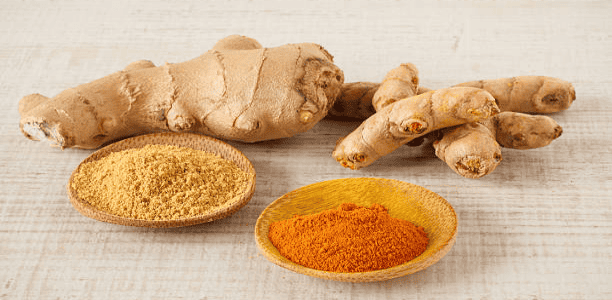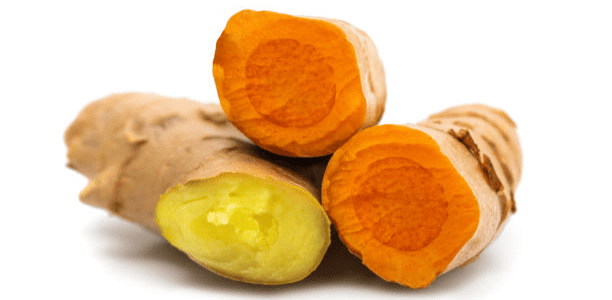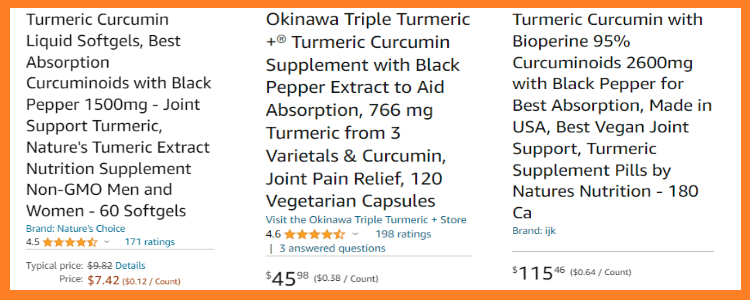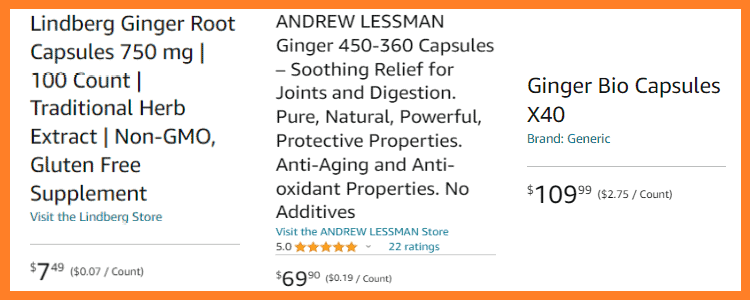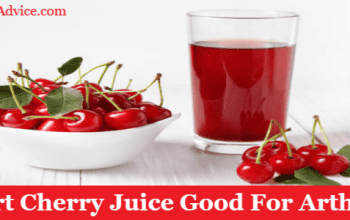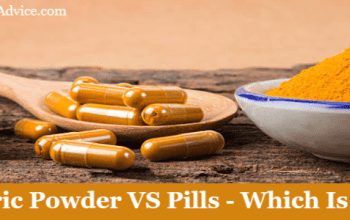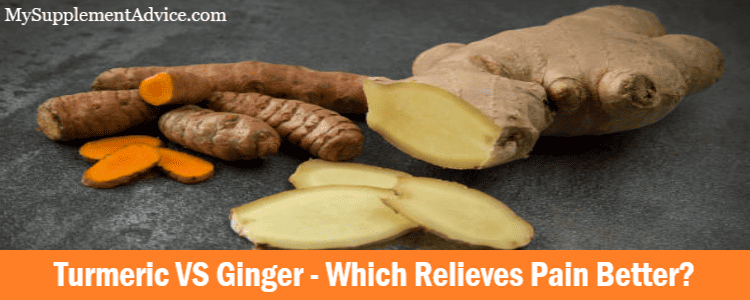
If you're looking for natural pain relievers, let's look at Turmeric VS Ginger.
Which one of them is a better anti-inflammatory?
Is their effect the same (or at least similar)?
If you want to know the real deal behind these two herbs, you're in the right place!
Note: This article includes references and studies on these 2 herbs.
Turmeric VS Ginger? (In A Nutshell)
Short;y, we're going to compare turmeric and ginger when it comes to their effect on pain.
Now – both herbs have been traditionally used for their medicinal properties.
But the overall winner is turmeric:
- it's the top anti-inflammatory and pain-relieving herb
- curcumin (its major bioactive compound) is stronger than gingerol
- it offers a wide range of health benefits
- supplements with turmeric are more affordable and easier to find
Again – ginger also does a pretty good job of alleviating pain.
But it doesn't have as many studies as turmeric.
Also – you might notice that ginger possesses similar features when it comes to inflammation.
Well, the reason is because of their exact plant family origin.
However – the pain-relieving potency of turmeric is higher (as proved by the research).
Just make sure you take only what your body can tolerate.
Lastly – if you're looking for a high-quality turmeric supplement, I have a recommendation.
The product is called Turmeric Curcumin Plus and it's actually the very best one I know.
Among all similar supplements, it has the best formula and many other promising features.
It's a product that would help you a lot without breaking the bank.
Overall – turmeric is better than ginger in terms of targeting pain and inflammation.
#1 – Potency & Strength – WINNER: Turmeric
Now – the first aspect that we're going to discuss is the herb's strength.
This is what tells you whether an herb really works (or not)
With that, let's list down some vital details of turmeric and ginger:
- physical features and origin
- their active compounds
- how they work to relieve pain
As usual – I'm already going to give you a quick answer.
In this category, turmeric alleviates pain better than ginger.
Although both herbs come from the same family, turmeric has a more potent compound (curcumin).
That's why it's considered the best anti-inflammatory herb.
With that, let me share some detailed reasons further down the line.
1. Turmeric
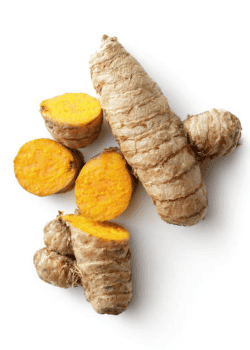
- its scientific name is Curcuma longa
- the plant family of it is called Zingiberaceae
- its most distinctive physical attribute is its bright yellow color
- this herb has been used as traditional medicine for hundreds of years
- its active compound is called curcumin [2]
Now – curcumin is the most studied component of turmeric.
That's because of its anti-inflammatory and antioxidant properties.
It works by inhibiting the enzymes and cytokines that promote inflammation.
Additionally – it can also help regulate the immune response to reduce pain and symptoms.
2. Ginger
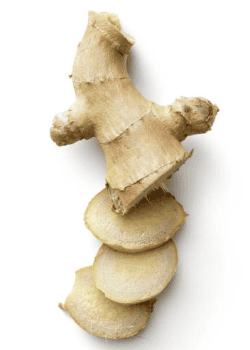
- Zingiber officinale is its scientific name
- it also belongs to the Zingiberaceae plant family
- unlike turmeric, it has a pale yellowish-brown color
- it has been used as a culinary and medicinal herb for centuries
- its primary bioactive compound is called gingerol
Additionally – ginger has other known compounds.
But let's focus on gingerol, due to its immunomodulatory and anti-inflammatory potential [4].
This substance can reduce the activation of proteins and signaling pathways connected to inflammation.
Consequently, this would decrease the number of pro-inflammatory cytokines.
Lastly – its analgesic properties can also help alleviate discomfort and pain.
Conclusion
To summarize, both turmeric and ginger can relieve some sort of pain.
Also – both have unique properties, due to their active compounds.
However, turmeric stands out since it's stronger when it comes to pain and inflammation.
That's why it's been studied more and it's ranked as the #1 anti-inflammatory herb.
#2 – Clinical Studies & Research – WINNER: Turmeric
Let's now move on to the research about turmeric and ginger.
To be exact, we're going to talk about their benefits backed by studies.
The winner is once again turmeric – but that doesn't mean ginger is no longer useful.
1. Turmeric
At this point, we already know that turmeric offers some major benefits.
So to give you an insight, here are some of them:
- reduces joint pain and inflammation [5]
- decreases inflammation-related digestive issues [6]
- manages allergic inflammation [7]
- addresses issues connected to inflammatory acne [8]
- enhances insulin sensitivity [9]
The benefits above are due to turmeric's anti-inflammatory properties.
To be specific, curcumin can hinder the substances that promote inflammation.
However – it has a low bioavailability, which means it can be metabolized very badly [10].
Without an absorption enhancer, most of it will actually be eliminated instantly.
For this reason, take it with piperine to optimize its absorption and get its maximum potency.
Overall – it's the major factor you should consider in selecting turmeric supplements.
2. Ginger
Of course, we're also going to highlight ginger's major benefits:
- modulates pain related to muscles, dysmenorrhea and arthritis [11]
- is an anti-inflammatory and antioxidant [12]
- alleviates digestive issues (constipation, bloating and IBS) [13]
- reduces nausea
- can calm down nerve pain [14]
Ginger's bioactive component gingerol is the major key player in the benefits above.
It contributes to alleviating pain, since it can inhibit inflammatory substances.
Additionally – its analgesic properties can lower the pain sensation [15].
Lastly, it can also help calm the nerves, which can further reduce the activity of pain signaling pathways.
With that – ginger can provide relief from mild to moderate type of pain.
But it's not as strong as turmeric when it comes to severe (or chronic) pain.
Overall – it can still be used as a complementary ingredient, alongside other stronger herbs.
Conclusion
Now – turmeric and ginger offer several benefits.
Both of them can alleviate pain, inflammation and other health issues.
However – when it comes to research, turmeric has way more studies, since it's more potent.
You can still choose ginger, but turmeric's effect is straight to the point.
#3 – Side Effects – DRAW
As I always say, herbs have a very low risk of adverse reactions.
But that doesn't mean that they 100% safe.
Now, why turmeric and ginger are at about the same level from this point of view.
With that, let's see the potential side effects of both of them.
1. Turmeric
Now – you might be wondering about the potential side effects of turmeric.
Here's what you may experience (on paper) [16]:
- diarrhea and digestive discomfort
- teeth staining
- thinning of the blood
- allergy/allergic reactions
You can always avoid some of these issues by taking preventive measures.
For instance – if you're allergic, find other alternatives.
If you have a sensitive stomach, try to eat before taking turmeric.
In addition, maintaining a good oral hygiene will keep it from staining your teeth.
Now, curcumin can also help with platelet aggregation [17].
So it's best to consult your doctor first.
That especially if you're taking prescription drugs like anticoagulants or blood thinners.
Overall – remember that these adverse reactions don't occur frequently.
2. Ginger
Just like turmeric, ginger is also safe in general.
However – it can also lead to a range of possible adverse reactions if taken in excess [18]:
- gastrointestinal issues (diarrhea or loose bowel movement)
- indigestion, heartburn or constipation
- blood thinning or bleeding (worst case)
- allergic reactions or itching
- depression and arrhythmia
As you can see, there are similarities to turmeric's side reactions.
Once again – that's because of the herbs' plant origin.
For this reason, consume ginger in moderation or don't exceed the recommended dosage.
Also – if you have existing health conditions that need prescription medicines, seek medical advice beforehand.
Conclusion
None of these 2 herbs is better than the other in terms of safety.
As long as you're taking any of them properly, you're good to go.
#4 – Price – WINNER: Turmeric
Finally – let's compare turmeric and ginger in terms of the factors below:
- cost-effectiveness
- availability
- affordability
As early as now, turmeric is a superior choice to ginger.
So let me further give you some more vitals details below for your guidance.
1. Turmeric
Let's first take a look at the turmeric supplements available on Amazon:
- the lowest price I found so far is approximately $7/bottle
- meanwhile, the highest price is around $115 for a bottle
Honestly – you can find a turmeric supplement that will suit your budget.
That's because there is a wide range of choices for every price point.
Additionally – turmeric is very accessible, so I don't think it would be hard for you to find one.
However, I strongly advise you to prioritize the product's quality over its low price tag.
In that way, you would get what you pay for.
2. Ginger
On the other hand, let me share the prices of ginger supplements (also from Amazon):
- $7 for a bottle is currently the lowest price I could find
- conversely, $110 per bottle is the highest estimated price (so far)
If you compare ginger to turmeric, it doesn't have that many options.
Actually – you rarely find a supplement that contains ginger alone.
Most of the time, it's combined with turmeric or Boswellia (for a stronger effect).
Well – there's nothing wrong with trying ginger supplements.
But it shouldn't be your top option, especially since there are better options available.
Conclusion
Overall – turmeric and ginger have several product options at any price point.
Also, they have a lot of similarities .
But if you're looking for a great investment, go for turmeric products directly.
#5 – Top Product
Again – turmeric is renowned as the top anti-inflammatory herb.
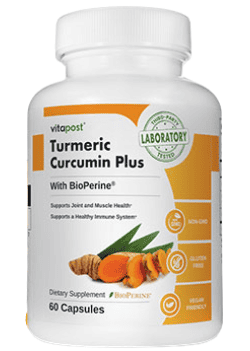
So if you're looking for the best supplement with turmeric, I have an excellent suggestion.
The product I'm pertaining to is called Turmeric Curcumin Plus:
- has a high amount of curcumin
- contains the best absorption enhancer (BioPerine)
- really works to reduce pain and inflammatory symptoms
- its daily intake is convenient
- minimal risk of adverse reactions
- justifiable price for the excellent features it offers
- numerous previous users that swear by it
Although ginger might sound the same as turmeric, it's actually not at all.
Turmeric is lower in terms of price, but higher in terms of strength and effect.
Overall – it's a promising supplement that will give value to your time and money.
My Verdict – Turmeric Or Ginger?
Short answer: Turmeric is better than ginger.
Sure – both of them have their own advantages in terms of relieving pain.
But turmeric stands out among all its other features>
- has way more research supporting its pain-relieving effect
- is the best herb against inflammation
- its risk of side effects is pretty low
- turmeric supplements are more accessible and easier to find
Truth is – ginger also has benefits in reducing pain.
But since turmeric is stronger, it's more practical to choose it instead.

In this way, your body can fully absorb its curcumin content.
There are a lot of turmeric supplements out there.
But only a few of them have absorption enhancers -so always check the product label before purchasing.
Now – I have a very good suggestion for you, it's called Turmeric Curcumin Plus:
- can definitely relieve pain and symptoms of inflammation
- has a potent dose of curcumin (95%)
- contains the best version of absorption booster (BioPerine)
- has a great price tag
To sum it up, turmeric and ginger are good for your health.
But turmeric is the #1 anti-inflammatory herb, so it's clearly the better option.
References:
1 – https://www.nccih.nih.gov/-health/-turmeric/
2 – https://www.ncbi.nlm.nih.gov/-pmc/articles/-PMC5664031/
3 – https://www.ncbi.nlm.nih.gov/-books/-NBK92775/
4 – https://www.frontiersin.org/-articles/fphar.2022.902551/-Gingerols/
5 – https://pubmed.ncbi.nlm.nih.gov/-33914984/
6 – https://pubmed.ncbi.nlm.nih.gov/-19519446/
7 – https://pubmed.ncbi.nlm.nih.gov/-18398870/
8 – https://pubmed.ncbi.nlm.nih.gov/-27213821/
9 – https://www.ncbi.nlm.nih.gov/-pmc/articles/-PMC8004232/
10 – https://www.ncbi.nlm.nih.gov/-pmc/articles/-PMC6770259/
11 – https://www.ncbi.nlm.nih.gov/-pmc/articles/-PMC7754412/
12 – https://www.ncbi.nlm.nih.gov/-pmc/articles/-PMC3665023/
13 – https://www.ncbi.nlm.nih.gov/-pmc/articles/-PMC3958926/
14 – https://www.unr.edu/nevada-today/2022/-food-spices-anxiety-stress/
15 – https://www.sciencedirect.com/-science/article/-S2213434416300056/
16 – https://www.ncbi.nlm.nih.gov/-pmc/articles/-PMC5664031/
17 – https://www.sciencedirect.com/-science/article/-S037887411100479X/
18 – https://www.ncbi.nlm.nih.gov/-books/-NBK565886/

